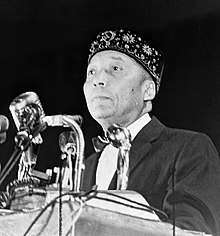利用者:Wonozy/sandbox
| イライジャ・ムハンマド Elijah Muhammad | |
|---|---|
 1964年のイライジャ・ムハンマド | |
| ネイション・オブ・イスラームの指導者 | |
| 任期 1934–1975 | |
| 前任者 | Wallace Fard Muhammad[1] |
| 後任者 | Warith Deen Mohammed |
| 個人情報 | |
| 生誕 | イライジャ・ロバート・プール 1897年10月7日 サンダーズビル市, ジョージア州, アメリカ合衆国 |
| 死没 | 1975年2月25日(77歳没) シカゴ, Illinois, U.S. |
| 配偶者 | Clara Evans (結婚 1917年; 死別 1972年) |
| 子供 | at least 23 (8 with Evans, 15 with others), including Jabir, Warith, and Akbar |
| 職業 | ネイション・オブ・イスラームの指導者 |
イライジャ・ムハンマド(Elijah Muhammad, 1897年10月7日 - 1975年2月25日)はアメリカの宗教指導者 、黒人分離主義者。アッラーの預言者を自称しネイション・オブ・イスラーム (NOI) を1934年から1975年にかけて指導した。[1][2][3] ムハンマドはマルコム・Xや Louis Farrakhan、モハメド・アリ、自身の息子であるWarith Deen Mohammedの教育者、助言者でもあった。
In the 1930s, Muhammad formally established the Nation of Islam, a religious movement that originated under the leadership and teachings of Wallace Fard Muhammad and that promoted black power, pride, economic empowerment, and racial separation. Elijah Muhammad taught that Master Fard Muhammad is the 'Son of Man' of the Bible, and after Fard's disappearance in 1934, Muhammad assumed control over Fard's former ministry, formally changing its name to the "Nation of Islam".
Under Muhammad's leadership the group grew from a small, local black congregation into an influential nationwide movement. He was unique in his embrace of both black nationalism and pan-Africanism, with traditional Islamic themes. He promoted black self-sufficiency and self-reliance over integration, and he encouraged African Americans to return to their African homeland. Muhammad also rejected the civil rights movement for its emphasis on integration, instead promoting a separate black community.
His views on race and his call for blacks having an independent nation for themselves, made him a controversial figure, both within and outside the Nation of Islam. He has been variously described as a black nationalist, a black supremacist, and a religious leader who fought for the rights of African Americans.
Muhammad died on February 25, 1975, after a period of declining health. He was succeeded as head of the NOI by his son, Wallace Muhammad, who renamed the organization as the World Community of al-Islam in the West. Wallace Muhammad later changed his name as part of his own transition to Sunni Islam and is now known as Imam Warith Deen Mohammed.
- ^ a b Fletcher, Jeannine H., ed (June 2020). “The Creation of the Devil and the End of the White Man's Rule: The Theological Influence of the Nation of Islam on Early Black Theology”. Religions (Basel: MDPI) 11 (6: Racism and Religious Diversity in the United States): 305. doi:10.3390/rel11060305.
- ^ Wessinger, Catherine, ed (August 2016). “Science and Technology in Elijah Muhammad's Nation of Islam: Astrophysical Disaster, Genetic Engineering, UFOs, White Apocalypse, and Black Resurrection”. Nova Religio: The Journal of Alternative and Emergent Religions (Berkeley: University of California Press) 20 (1): 5–31. doi:10.1525/novo.2016.20.1.5. hdl:1805/14819. ISSN 1541-8480.
- ^ Boekhoff-van der Voort, Nicolet; Versteegh, Kees; Wagemakers, Joas, eds (2011). “Elijah Muhammad's Redeployment of Muḥammad: Racialist and Prophetic Interpretations of the Qurʾān”. The Transmission and Dynamics of the Textual Sources of Islam: Essays in Honour of Harald Motzki. Islamic History and Civilization. 89. Leiden: Brill Publishers. pp. 329–353. doi:10.1163/9789004206786_017. ISBN 978-90-04-20678-6. ISSN 0929-2403
